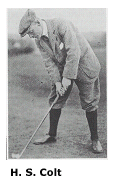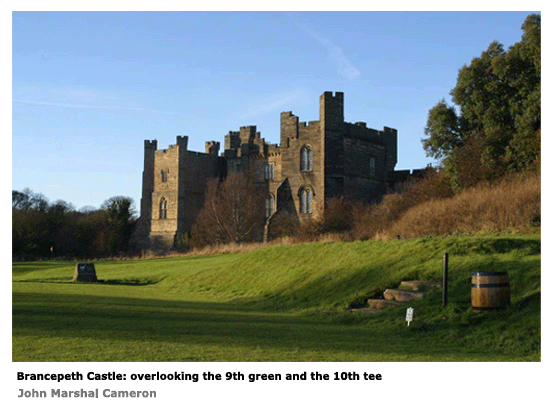|
Chapter 3. My Brother Professionals
In 1924, the year that the first Labour Government was elected and
Mallory and Irvine were lost on Everest, my brother Charles was
appointed Professional at the newly formed Brancepeth Castle Golf
Club in County Durham and I, aged 15, joined him as assistant. With
the castle as a backdrop it is a wonderfully scenic course and a
severe test of golf.
 The
designer was one of Britain’s greatest architects, Harry Shapland
Colt, who learnt his golf among the lamp posts, ditches and washing
lines on Malvern Common some thirty odd years before me, when his
family came on summer holidays during the 19th century boom years of
the spa town. His designs included some of the most famous courses at
home and abroad. Brancepeth was to go on to host a number of
important competitions and was rated in the top hundred in the
country as late as the 1980s. It is a splendid layout on part of the
old Deer Park, with lovely springy turf and is a joy to play on, but
in the early days the course was tough going in every respect. It
consisted of tees, fairways and greens and near waist high rough,
with nothing in between and many a game came to an end when the ball
supply ran out, including one match involving a future Walker Cup
player – who lost nine balls! Deep ravines added to the challenge,
involving a steep descent to cross a small bridge over the stream at
the bottom and then a stiff climb. Eventually trestle bridges were
built across the ravines, but in those early days a round was a
severe test of stamina as well as golf. If your ball supply held out
until the final hole you were faced with the hardest tee shot of the
round – a carry of nearly 200 yards over the biggest of the ravines.
Most players didn’t fancy their chances and bailed out by hitting to
a narrow plateau half way across. The 207-yard 9th is a memorable
par-3, below the Castle walls, played across a wooded ravine to a
target green and guarded by a large cedar on the left side – planted
to commemorate the visit of Queen Mary. An American magazine made it
the most difficult in the world and Peter Alliss included it in his
best 18 holes in the world. The
designer was one of Britain’s greatest architects, Harry Shapland
Colt, who learnt his golf among the lamp posts, ditches and washing
lines on Malvern Common some thirty odd years before me, when his
family came on summer holidays during the 19th century boom years of
the spa town. His designs included some of the most famous courses at
home and abroad. Brancepeth was to go on to host a number of
important competitions and was rated in the top hundred in the
country as late as the 1980s. It is a splendid layout on part of the
old Deer Park, with lovely springy turf and is a joy to play on, but
in the early days the course was tough going in every respect. It
consisted of tees, fairways and greens and near waist high rough,
with nothing in between and many a game came to an end when the ball
supply ran out, including one match involving a future Walker Cup
player – who lost nine balls! Deep ravines added to the challenge,
involving a steep descent to cross a small bridge over the stream at
the bottom and then a stiff climb. Eventually trestle bridges were
built across the ravines, but in those early days a round was a
severe test of stamina as well as golf. If your ball supply held out
until the final hole you were faced with the hardest tee shot of the
round – a carry of nearly 200 yards over the biggest of the ravines.
Most players didn’t fancy their chances and bailed out by hitting to
a narrow plateau half way across. The 207-yard 9th is a memorable
par-3, below the Castle walls, played across a wooded ravine to a
target green and guarded by a large cedar on the left side – planted
to commemorate the visit of Queen Mary. An American magazine made it
the most difficult in the world and Peter Alliss included it in his
best 18 holes in the world.

The club is situated in a very small but lovely village about 4 ˝
miles out of Durham and somewhat isolated in those days, so it took
some time for the membership to build up. Most of the members came
from Durham, Sunderland and Seaham harbour, involving quite a
journey at that time. A few came by car, but most travelled by train
or bus. The club had a special relationship with the Railway
Company, as the public ‘Motor Train’ service was rather infrequent.
They usually managed to get there somehow and the membership grew
steadily.
NEXT |